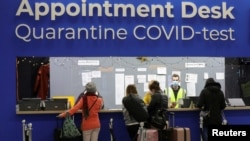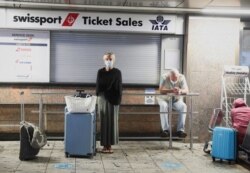Dutch health officials said Sunday 13 people who recently arrived in the Netherlands on flights from South Africa have tested positive for the new omicron variant of the coronavirus.
The passengers were part of a group of 61 who tested positive following their arrival in Amsterdam on Friday.
The announcement came shortly after Australia said two cases of the variant were discovered in passengers who recently arrived in Sydney.
Omicron is the fifth WHO-designated variant of concern. It was first detected recently in South Africa, which has seen an exponential rise in COVID-19 cases.
There are about 30 mutations on the coronavirus' spike protein, and scientists worry that some of them could make the virus easier to transmit. But scientists do not yet know whether omicron is in fact more transmissible or dangerous.
Cases of the variant have also been discovered in Israel, Hong Kong and several European countries.
Concern over the variant has prompted many countries, including the United States, Canada, Brazil, and European Union nations, to restrict or ban travel from southern African countries.
The South African government has called the travel restrictions "rushed" and raised concerns about the impact on business.
The top U.S. infectious diseases expert, Dr. Anthony Fauci, has said he would not be surprised if the omicron variant were already in the U.S.
On Sunday, Fauci told ABC’s “This Week” program that the omicron variant “appears” to be more transmissible than other variants, but health officials are still not sure if it causes more severe disease.
He said efforts are under way to determine if current COVID-19 vaccines are effective against the new variant and the answer likely will come in the next two weeks.
“I don’t think there’s any possibility that this could completely evade any protection by vaccine. It may diminish it a bit, but that’s the reason why you boost,” Fauci said, referring to booster shots.
In South Africa, roughly 35% of the adult population is vaccinated. Figures are even lower across much of the African continent.
Heath experts have warned vaccine inequality would create a breeding ground for virus mutations.
Information for this report came from The Associated Press and Reuters.






